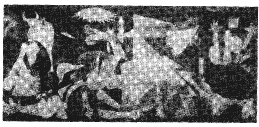题目内容
阅读理解(Reading comprehension)
Pablo Picasso was born in Spain in 1881 and died in France in 1973. He was one of the most important artists of the twentieth century.
Picasso's early paintings were realistic, but later he began to look at things in new ways. He experimented with shapes and colors. Soon the shapes and colors. became more important to him than the real things in his pictures.
Picasso painted many important pictures, but his most famous is a very large painting called Guernica. Guernica is a small town in Spain. It was bombed(attacked with bombs) and ruined(毁灭) in 1937, during the Spanish Civil War. Many people died.
Picasso was angry. He wanted to show that war is terrible. The painting has only three colors-black, white, and gray. It is abstract(expressing the artist's ideas and feelings about certain things), but you can see some real things in it. On the left side are a mother and her dead baby, a bull and a horse, and a dead man with a broken sword(剑) and a flower. On the right are three people. One of them has a lamp. They are sad and helpless.
Along with the realistic things, there are many symbols in the painting. Symbols are things that represent(describe) ideas. No one knows what all the symbols mean. They mean different things to different people. But everyone agrees that this painting shows the horror(sth. that makes people very afraid) of war.
Guernica is in the Prado Museum in Madrid.
Complete the sentences about Picasso with the correct words.

1.Picasso was born in ________ in 1881 and died in France in________.
2. When he was young, Picasso painted realistic paintings, but he is famous for his ________ paintings.
Write down four things that the reading mentions in the painting.(except the sword)
3.________and ________
4.________and________
5.The broken sword is a symbol of________.
解析:
|
1.Spain, 1973;2.abstract;3.a bull, a horse;4.a flower, a lamp;5.the end of the war |

阅读理解(Reading comprehension)
A French girl outside Buckingham Palace said:“I was so excited. I saw the Queen! She came out in a Rolls Royce. I've been interested in your royal family since I was a little girl. I've read all the stories, especially about Charles and Diana, in French newspapers and magazines. They tell me what your royal family really do. Your newspapers can't tell the truth about them!”
An Italian boy, who was in Britain for the first time, talked about the weather. “I can' t understand it. I've been here for over a week, and I still haven' t seen any fog!”
A Japanese student from Tokyo said:“I've been in Britain since April, and I' m living with a British family. I've noticed one big difference between British and Japanese families. British men do jobs like cooking, washing up and ironing. They're jobs which I've never seen Japanese men do. They think it' s women's work. But I don' t agree!”
A German student, at a language school in Oxford said:“I thought Britain was a modern European country, you've been in the EEC for years now. So why do you still use miles, pints, and pounds, instead of kilometres, litres and kilos? And why do you still drive on the wrong side of the road?”
A Danish girl in Brighton said:“I came to Britain a month ago. I've noticed one very strange thing here. After British people have washed the dishes, they never rinse(remove…with water) them. They just take them out of the dirty, soapy water and leave them to dry!”
A Swedish girl said:“I've watched a lot of television since I arrived in Torquay two weeks ago. British television's wonderful! But the “programmes” which I've enjoyed most are the advertisements. They're very funny a very clever, or both. Back home in Sweden we don't have any TV advertisements at all!”
Who said what?

Who do you think said these things? Write them on your answer sheet.
1.□
It makes shopping very difficult. For example, I don't know what size shoes or jeans to ask for.
2.□
Did you know that he did not speak to her at that time, except in public?
3.□
I enjoy guessing what they're for, you know beer or toothpaste or whatever, before they actually name the product.
4.□
I help too-my friends at home would be very surprised if they could see me.
5.□
In fact the sun hasn't stopped shining-it's not at all like in old films and Dickens novels.
6.□
Surely it's not difficult to put them under the cold tap for a moment.



